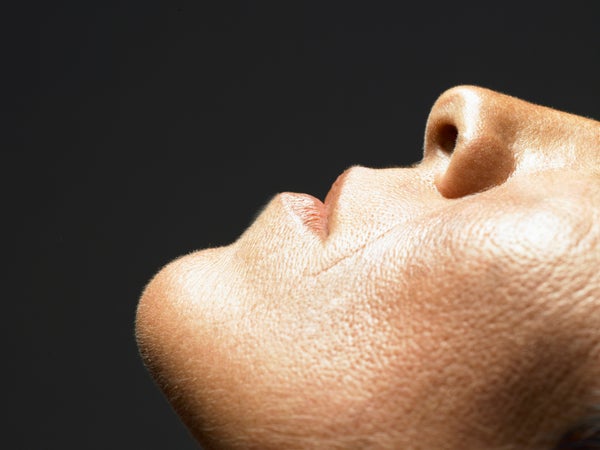The smell of coffee may urge you out of bed in the morning, and the perfume of blooming lilacs in the spring is divine. But you do not see police officers with their noses to the ground, following the trail of an escaped criminal into the woods. Humans do not use smell the way other mammals do, and that contributes to our reputation for being lousy sniffers compared with dogs and other animals. But it turns out the human sense of smell is better than we think.
In a review paper published in Science last week neuroscientist John McGann of Rutgers University analyzed the state of human olfaction research, comparing recent and older studies to make the argument our smelling abilities are comparable with those of our fellow mammals.
McGann traces the origins of the idea that humans have a poor sense of smell to a single 19th-century scientist, comparative anatomist Paul Broca. Broca, known for discovering Broca’s area—the part of the brain responsible for speech production—noted that humans had larger frontal lobes than those of other animals, and that we possessed language and complex cognitive skills our fellow creatures lacked. Because our brains’ olfactory bulbs were smaller than those of other mammals and we did not display behavior motivated by smell, Broca extrapolatedthese brain areas shrank over evolutionary time as humans relied more on complex thought than on primal senses for survival. He never conducted sensory studies to confirm his theory, however, but the reputation stuck.
On supporting science journalism
If you're enjoying this article, consider supporting our award-winning journalism by subscribing. By purchasing a subscription you are helping to ensure the future of impactful stories about the discoveries and ideas shaping our world today.
Scientists built on that tenuous foundation over the years, McGann says. Geneticists saw supporting evidence for humans’ limited olfactory abilities because we have a smaller fraction and number of functioning olfactory genes—but again this was not well tested. The idea that color vision took the evolutionary pressure off olfaction was later debunked when no link was found between that evolutionary development and smell loss. In addition, the size of olfactory bulbs, both in absolute terms and in proportion to the brain, does not relate directly to smelling power as scientists once thought.
Now that more sensory tests are being done, the results are mixed. Experiments conducted in previous decades have found humans are just as sensitive as dogs and mice to the aroma of bananas. Furthermore, a 2013 study found humans were more sensitive than mice to two urine odor components whereas mice could better detect four other sulfur-containing urine and fecal-gland odors tested. A 2017 study also revealed humans were more sensitive than mice to the smell of mammal blood.
One biological feature that does appear to be linked to smelling ability is the number of olfactory bulb neurons an animal has. This number is not linked to the size of the brain or bulb, however. Human women, whose sense of smell is more sensitive than men’s, have more olfactory neurons than the general population of mice but fewer than rats, and have much larger olfactory bulbs than both rodents. Men rank just below mice in olfactory neuron count, but all these species (as well as several other mammals) differ by just 10 million olfactory neurons or fewer.
The lack of a standard metric for scent is the main challenge, McGann says, in comparing absolute olfactory abilities across species. “It’s tempting to say humans are way more sensitive than mice at smelling human blood, and that sounds like a good ecological story,” he says. “But then you look at a whole range of other odors and realize that actually it just seems like there’s quite a lot of odors that humans are better at detecting than mice, dogs or rats, and other odors that we’re less good at detecting.” It’s impossible, therefore, to make sweeping generalizations about which species has the winning nose.
Gustavo Glusman, a geneticist at the Institute for Systems Biology, agrees. “Different species specialize in smelling different things, and it’s therefore very hard to compare [them] meaningfully,” he explains. He also points out the brain’s plasticity. “It is well known that when one function is lost, other functions become more nuanced,” such as increased hearing ability after vision loss.
McGann also says humans use smell much more than we generally assume. It affects how we experience food and take in our surroundings, and some of the most recent studies have looked at how body odor can reveal whether a person is anxious or aggressive, in addition to other details about the individual’s lifestyle. McGann thinks smell loss has been largely neglected as a medical issue because we underestimate its importance. He hopes to raise the profile of clinical olfaction and biomedical research in the field, he says, “so people who [have] lost their sense of smell can understand you really did lose something important. You’re not crazy that this is bothering you.”
